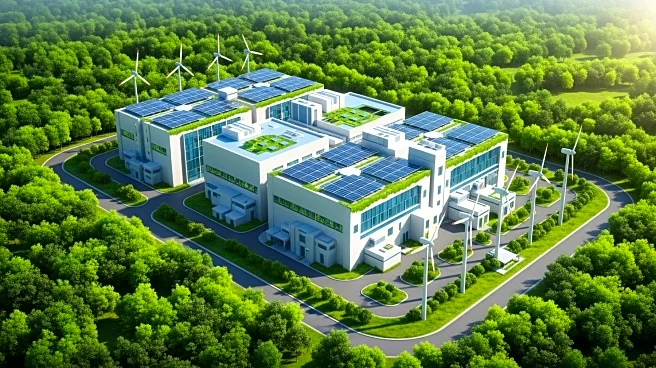What's Happening?
The semiconductor industry is undergoing a significant transformation towards sustainability, driven by the need to reduce its environmental footprint. This shift involves adopting green chemistry, improving
energy efficiency, and implementing waste reduction strategies. The industry is responding to regulatory pressures, investor demands, and the necessity for long-term viability. Key players like Intel, TSMC, and Samsung are investing in renewable energy and water recycling, while startups are innovating in niche areas such as green chemistry and AI-powered manufacturing optimization. These efforts aim to create a more sustainable and resilient supply chain, essential for the future of digital technology.
Why It's Important?
The move towards sustainable semiconductor manufacturing is crucial for reducing the industry's significant environmental impact, which includes high energy consumption, water usage, and hazardous waste generation. This transformation is not only about corporate responsibility but also about maintaining competitiveness and compliance with global environmental regulations. For tech giants and AI companies, sustainable practices are essential to meet net-zero commitments and reduce operational costs. The shift also presents opportunities for startups to provide eco-friendly solutions, potentially disrupting existing supplier relationships. Overall, this green revolution is setting a new standard for responsible innovation in the tech industry.
What's Next?
In the near term, the industry is expected to adopt 100% renewable energy for manufacturing facilities and achieve high levels of water recycling. Green chemistry will become more prevalent, and AI will be increasingly used for process optimization. In the long term, the industry will embrace circular economy principles, focusing on resource recovery and extending product lifecycles. Challenges remain, such as managing hazardous chemical use and e-waste, but the integration of green hydrogen and smart manufacturing are seen as crucial next steps. The industry's commitment to sustainability will continue to shape its competitive dynamics and technological advancements.
Beyond the Headlines
The drive for sustainable semiconductor manufacturing has broader implications, intertwining with the AI landscape, global economic trends, and societal well-being. Sustainable chip production is essential for the growth of AI, which demands powerful processors. AI also plays a role in achieving sustainability goals within fabs. Economically, sustainable practices foster resilience and competitiveness, while socially, they create high-skilled jobs and improve community health. However, the high upfront costs and technological challenges remain significant hurdles. The industry's efforts are crucial in mitigating its contribution to climate change and promoting a more responsible technological future.










